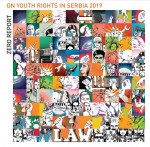Serbian media have increasingly been reporting on the situation of young people in the country since the beginning of the year. They have been discussing youth migration, notably emigration of youths from Serbia, their housing and announcements of state projects to address sustainable housing issues, and elections, by monitoring the activities of specific youth groups in the country’s political life.
The Belgrade Centre for Human Rights has for years been implementing activities in the youth sector and working with young people across Serbia. It has begun reporting on the human rights of youths on an annual level with the cooperation and expert assistance of the United Nations Human Rights Team. Its 2019 Zero Report on Youth Rights in Serbia shows that youths are neglected, leaving the country, insufficiently involved in decision-making, underrepresented in the media and, at great risk of poverty.
Herewith the key findings of the Report:
o Youths between 15 and 24 years of age are at twice the risk of poverty as the adult population;
o Most youths (57%) are engaged in some form of precarious employment: part-time employment (36%), temporary and occasional employment (8%) or informal employment (11%);
o Youths are paid 20% lower wages; one out of three workers under 30 are paid wages lower than two-thirds the median wage; eight out of ten youths are paid wages lower than the national average; and, one out of five earn less than the minimum wage every month;
o Around half a million people aged 20-34 in Serbia live with their parents; one-third of them have no prospects of living independently because they have no income; many of those that have jobs continue living with their parents because they cannot afford to rent their own place and live decently on the money left over; and, young people mostly resolve their housing problems through inheritance or with their parents’ financial assistance;
o Over 4,000 people who emigrate from Serbia every month are young; circa 51,000 people that leave Serbia every year equals the population of an average Serbian municipality;
o Youths, especially those in rural areas, do not have equal access to health care; more must be done to improve the protection of the reproductive health of young people and their protection from sexually transmitted diseases; 70% of youths between 15 and 29 years of age are sexually active but a much lower share of them uses contemporary contraceptives; the situation of youths living with HIV, multiple sclerosis and other grave illnesses is problematic;
o A large share of youths aged between 15 and 29, especially of poorer social and economic status, suffers from anxiety and depression;
o Only 40% of youths over 18 vote regularly, while 32.4% say they never vote.
The 2019 Zero Report on Youth Rights in Serbia shows that youths are the most interested in realising their economic and social rights, which they qualify as systemically jeopardised and neglected.
You may download the publication here.








